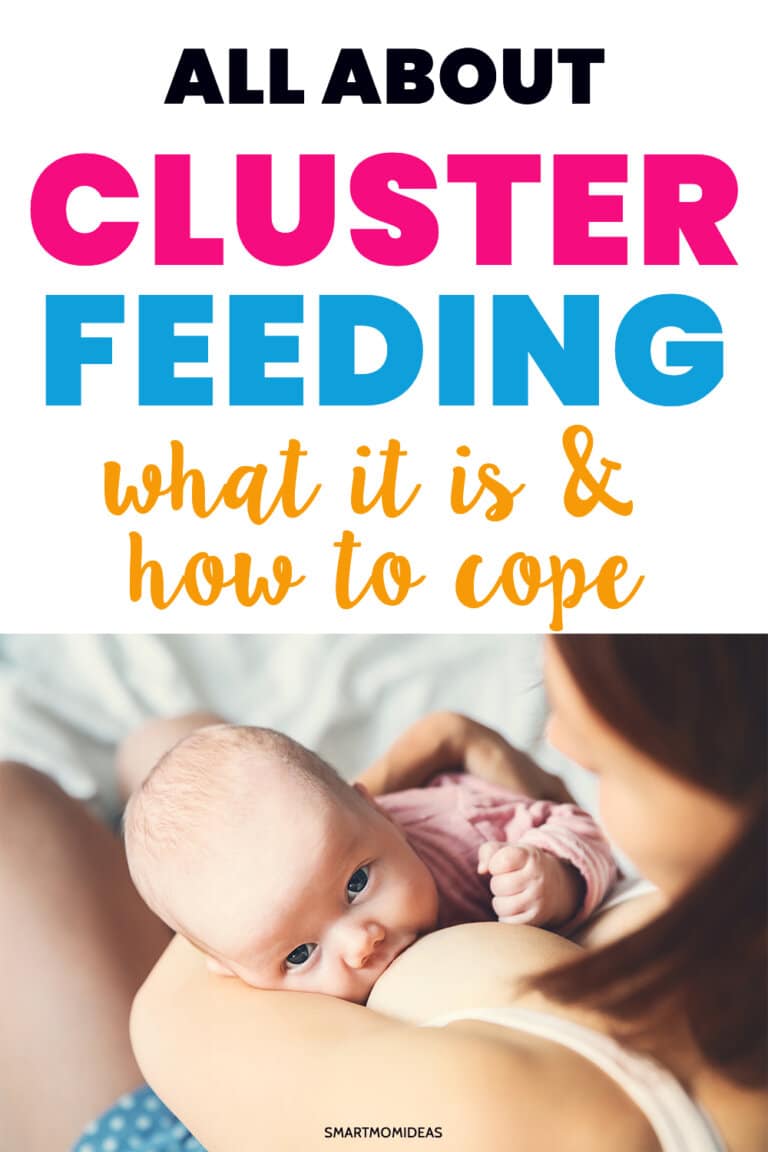Learn about cluster feeding as a new breastfeeding mom
As a new mom, do you find yourself constantly feeding your little one but they never seem satisfied?

Are they extremely fussy between feedings?
This can be physically and emotionally draining but also completely normal – especially in the early days of breastfeeding.
So don’t panic if your newborn starts treating your breasts like an all-you-can-eat buffet, coming back for more and more!
Babies will sometimes nurse frequently in order to feel full and support their development.
This is known as cluster feeding and tends to pass quite quickly.
What is Cluster Feeding?
Just as the name implies, cluster feeding occurs when a baby starts feeding more frequently in “clusters”.
Oftentimes, your newborn will feed and appear full, only to fuss for more milk in a shorter period of time than usual.
You may notice that your baby cluster feeds at night, but not during the day – or your little one may cluster feed at all times of the day.
It could also be that your baby has “snacks”, or shorter feedings, but never long and full feeds.
Basically, your little one will cluster feed in preparation for a growth spurt or simply to get ready to go to sleep.
It’s not a drawn-out phase of development but it can certainly be a tiring and frustrating one.
The Ultimate Breastfeeding Class!

How Long Does Cluster Feeding Last?
How long newborn cluster feeding lasts depends entirely upon your baby.
However, baby cluster feeding typically begins to lessen and eventually stop between 3-4 months old – but it can continue until six months in some cases.
As far as actual cluster feeding sessions go, they rarely last for more than two days at a time.
If the cluster feeding goes on for more than a week (usually in the early evening), it may be that your little one is not getting enough calories. Have your doctor check his or her weight.
Otherwise, hang in there and follow the tips below for coping with cluster feeding – it will end eventually.
Why Do Babies Cluster Feed?
There’s no one reason why a breastfed baby cluster feeds so it can sometimes be difficult to determine the exact cause.
However, there are contributing factors that can cause your newborn baby to feel the need to eat constantly:
- Slower milk flow. Babies usually drink more breast milk in preparation for long stretches of sleep. If your milk is flowing slower during this time, they may require more nursing to feel full.
- Growth spurts. One of the most common reasons for cluster feeding is a growth spurt. Your baby is growing at a fast rate and will need more sustenance to support their development.
- Your baby likes to nurse. It could be that your newborn simply enjoys nursing and finds it soothing – especially at night when they want to be comforted to sleep.
- Pain and discomfort. If your baby is teething or doesn’t feel well, they may seek out more breastmilk, which provides powerful antibodies to help fight illness and decrease pain.
- Developmental milestone. This frequent feeding session times could indicate a growth spurt or developmental milestone.
Eventually, your newborn baby will learn to self-soothe in other ways and the frequent feeding will start to decrease.
Does Cluster Feeding Mean You Have a Low Milk Supply?
Just because your little one is eating more breast milk frequently doesn’t necessarily mean you have a low milk supply – but it could be the cause.
To determine if your milk production is low, have your baby weighed by your doctor. They can use your baby’s weight gain to see if he or she is getting enough milk.
You can also keep track of your baby’s wet diapers to see if they are getting enough milk:
- Newborns should have an average of 1-2 wet diapers per day.
- Babies 4-5 days old should have an average of 6-8 wet diapers per day.
- Babies 1-2 months old should have an average of 4-6 wet diapers per day.
If your baby is gaining healthy weight and average the right number of wet diapers, it’s likely that the cluster feeding is being caused by something else and not how much breast milk you have.
However, if your milk supply is low, you can always find ways to increase your milk supply or speak to a lactation consultant.
Should You Supplement With Formula?
Since cluster feeding is usually caused by other factors than low milk supply, there is no need to supplement your baby’s diet with formula if they are cluster feeding as long as they are gaining healthy weight.
In fact, cluster feeding is your baby’s way of building up your milk supply! Every time your little one hits a growth spurt, he or she will cluster feed to increase your supply.
When you supplement with formula, your body misses out on those cues to produce more milk. In the end, you’ll have a low milk supply and have to rely on supplementing to meet your baby’s needs. So, with formula fed babies, this might mean something different.
What about bottle fed babies? I bottle fed my twins and I did notice periods of time when my son would cry after his bottle was finished. I would then breastfeed him the rest and this went on for a while and realized it was cluster feeding for him.
How to Cope with Cluster Feeding
There’s not really a whole lot you can do to stop cluster feeding but you can certainly take steps to cope with it and make the experience a lot less stressful and frustrating:
Accept Your Fate
Cluster feeding is what it is and you’re going to have to come to terms with it. It’s going to suck, and it’s going to be stressful, but it’s also going to last for only a short period of time.
Of course, if you suspect that your newborn’s cluster feeding is due to low milk supply, don’t hesitate to consult with your healthcare provider.
Otherwise, coping with cluster feeding is going to be a whole lot easier if you begin by accepting your (short-term) fate.
Avoid Nighttime Cluster Feeding
If you find your little one is cluster feeding at night, try to encourage more feedings during the day.
And by more feedings, I mean more full feedings – not just little sleepytime snacks. Try to keep them awake during the feedings.
The best time to do this is during the late afternoon (around 4 pm or so). You’re basically encouraging cluster feeding, just at an earlier part of the day.
This may help to discourage your newborn from cluster feeding at night. Mind you, baby sleep won’t stop nighttime feeds, but they won’t be marathon nursing sessions.
Set Up a Breastfeeding Station
Since your little one is demanding the breast all of the time, it’s best to get yourself comfy when you are nursing.
You can always set up a breastfeeding station! This will be your own little space where you can feed your baby while focusing on your own comforts.
Here are some things you should consider for your breastfeeding station:
- A comfortable chair that supports your body properly (and allows you to hold and support your baby properly too).
- An end table or basket to store nursing essentials such as nipple cream and nursing pads as well as something for you, such as a book, bottle of water, snacks, etc.
- A good nursing pillow that will help keep your baby in the proper nursing position while alleviating the strain on your arms and body.
The best part about a breastfeeding station is that it doesn’t have to be in your baby’s nursery. You can always set yourself up in the living room, for example, if you want to binge your favorite showing while nursing.
Just make sure the space is quiet and relaxing. This will make addressing your newborn’s cluster feeding less stressful and frustrating.
What about breastfeeding medicine? Should you take that? I would consult with your doctor first to see if this is an appropriate option for cluster feeding.
Try Not to Make Plans
When dealing with bunch feeding, you want to make the ordeal as stress-free as possible. This means eliminating causes of frustration before they happen.
It may be best if you stay in for a while during this cluster feeding stage – which, don’t forget, doesn’t last long!
You don’t need the frustration and disappointment of making plans or going out only to have to spend your time nursing a fussy baby.
However, if you do need to go out, considering wearing your baby in a wrap. That way, if little one needs a meal on-the-go, you can simply feed him or her while you continue about your day.
Learn Your Baby’s Cues
When your baby is cluster feeding, they’re going to want the milk no matter what you do – but you can get ahead of the crying and fussing by learning your baby’s hunger cue.
All babies are different and their babys cues are different too, but here are some common signs that your little one is about to want a marathon meal:
- Places fists to mouth, sucks on hands.
- Turns head, looking for your breast.
- Becomes more alert and active.
- Opens and closes mouth.
Keep these signs in mind when you do a cluster feeding session but also pay attention to how your baby acts before they start fussing for a feed.
Once you notice they are hungry, offer the breast right away. This won’t stop the cluster feeding, but it will calm the crying (which will keep you calm as well!).

Learn Your Baby’s Schedule
Cluster feeding typically happens around the same time every day. The more you can pinpoint when your newborn is about to cluster feed, the better you can prepare.
For instance, if your little one nurses at 6 pm, you can make sure you’ve had something to eat and can get comfy in your breastfeeding station.
There would be nothing worse than watching your little one have a meal while you are starving!
Anticipation and preparation are great ways to take the stress out of cluster feeding.
Treat Yourself!
Coping with cluster feeding is not easy for any mama, so you deserve a little reward!
This will give you something to look forward to once you get your breasts back to yourself.
It doesn’t have to be anything extravagant – a piece of chocolate, a warm shower, a cup of tea. Something that you can do peacefully that will make you feel relaxed and rewarded.
Have your partner hang out with, or even wear, the little one while you take a moment to yourself.
Bonus: This will help to strengthen the bond between your partner and child. What an amazing way to support your partner’s role as a parent!
Cluster Feeding Versus Colic
“Colic” is a term that refers to babies who cry frequently for long periods of time for no obvious reason and no amount of consoling brings relief.
Because of the fussiness that comes with cluster feeding, you may be wondering if your little one doesn’t, in fact, have colic.
Especially since colic can come on suddenly out of nowhere – and in the evenings.
One way to tell if your baby is cluster feeding or has colic is to look at their behavior while nursing.
A colic baby will not settle or feel soothed during a feeding, whereas a cluster feeding newborn will visibly settle down.
Plus, colicky babies tend to cry for at least three hours straight at least three days a week for at least three weeks in a row.
If you’re still not sure if your baby is cluster feeding or colicky, keep these symptoms of colic in mind:
- Baby’s face gets rid and their expression appears to be frowning or grimacing.
- Baby pulls up its legs as if experiencing stomach pain.
- Crying is loud and can sound like screaming.
- Baby cannot be consoled by feeding, rocking or even passing gas.
- Crying lasts for at least three hours.
- Once baby recovers, it’s as if nothing happened.
Should your baby be experiencing colic as opposed to cluster feeding, speak to your health professional about confirming a diagnosis of colic and ruling out any other health issues.
This Too Shall Pass…
Like many stages of your baby’s development, cluster feeding is just a bump on the road that will quickly pass.
I know, it will seem never-ending at the time, but your little one isn’t going to nurse or cluster feed forever!
Just take the time to prepare yourself mentally and physically for cluster feeding, should it happen, and you do just fine coping with this stage of development. For more help contact your La Leche League!
Your turn! Did your little one cluster feed? How did you deal with it? Share your tips in the comments!





Leave a Reply